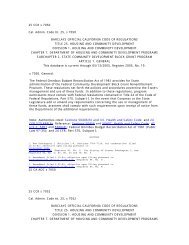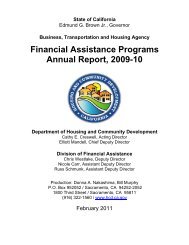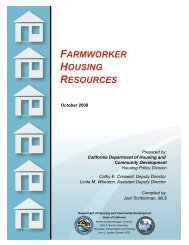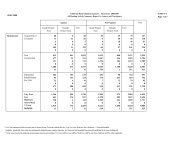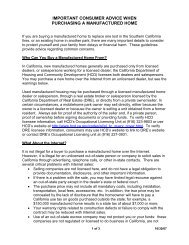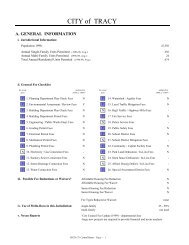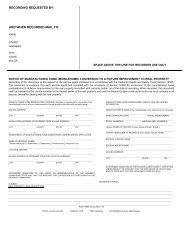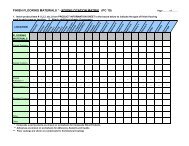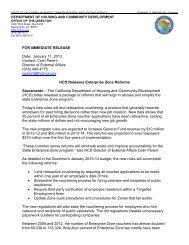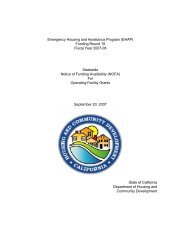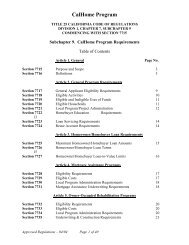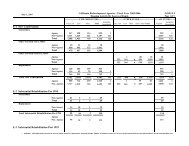Adobe PDF - California Department of Housing and Community ...
Adobe PDF - California Department of Housing and Community ...
Adobe PDF - California Department of Housing and Community ...
Create successful ePaper yourself
Turn your PDF publications into a flip-book with our unique Google optimized e-Paper software.
BOE PUBLICATION #47 <br />
• The contract <strong>of</strong> sale or other sales agreement cannot transfer ownership <strong>of</strong> the item to the Indian buyer<br />
before the item is delivered on the reservation; <strong>and</strong><br />
• The Indian buyer cannot take possession <strong>of</strong> the item before delivery on the reservation.<br />
In addition, the retailer generally must deliver the product by:<br />
• Using the retailer’s vehicle; or<br />
• By common carrier or contract carrier, when both <strong>of</strong> the following requirements are met:<br />
— The contract <strong>of</strong> sale or sales invoice must include a statement specifically requiring delivery at the<br />
reservation, <strong>and</strong> the bills <strong>of</strong> lading must have an F.O.B. destination clause.<br />
— The goods are in fact delivered to the Indian reservation.<br />
When delivery does not take place as described here, ownership <strong>of</strong> the item being sold or purchased generally<br />
transfers to the Indian buyer <strong>of</strong>f the reservation.<br />
Please note: This is a general description <strong>of</strong> transfer <strong>of</strong> ownership on the reservation. Other specific rules may<br />
apply to certain types <strong>of</strong> sales <strong>and</strong> leases.<br />
Claimed exempt sales to Indians require documentation<br />
Retailers<br />
When you make a claimed exempt sale to an Indian, you should keep copies <strong>of</strong> documents that BOE auditors can<br />
use to verify that your sale is exempt. You need:<br />
• One or more documents that show the purchaser is an Indian, such as a tribal ID card, a letter from a<br />
tribal council, or a letter from the U.S. <strong>Department</strong> <strong>of</strong> the Interior (or Bureau <strong>of</strong> Indian Affairs);<br />
• Documents to show that ownership <strong>of</strong> the merch<strong>and</strong>ise transferred to the Indian buyer on the<br />
reservation <strong>and</strong> delivery occurred there, such as contracts <strong>of</strong> sale, invoices, bills <strong>of</strong> lading, delivery<br />
receipts, <strong>and</strong> freight invoices; <strong>and</strong><br />
• An exemption certificate from the Indian purchaser stating that the Indian purchaser lives on a<br />
reservation. You may obtain a copy <strong>of</strong> BOE-146-RES, Statement <strong>of</strong> Delivery on a Reservation, for this<br />
purpose. (See page 31) Purchasers<br />
If you are an Indian who lives on a reservation, you will need to prove to the retailer that you qualify for the tax<br />
exemptions explained in this publication. You may need to give the retailer both <strong>of</strong> the following:<br />
• A copy <strong>of</strong> a document showing that you are an Indian, such as a tribal ID card, a letter from your tribal<br />
council, or a letter from the U.S. <strong>Department</strong> <strong>of</strong> the Interior (or Bureau <strong>of</strong> Indian Affairs).<br />
• An exemption certificate stating that you live on a reservation <strong>and</strong> other required contents (see next<br />
section).<br />
If you are an Indian organization, you must also provide documents to prove that you qualify for the tax<br />
exemptions explained in this publication. You may need to give the retailer:<br />
• Documents to show that all <strong>of</strong> your members or partners are Indians, such as articles <strong>of</strong> incorporation<br />
<strong>and</strong> partnership agreements;<br />
• If your organization is a corporation, documents to show it is organized under tribal authority, such as<br />
the organization’s articles <strong>of</strong> incorporation; <strong>and</strong><br />
• An exemption certificate containing certain other required content (see next section).<br />
Exemption certificates<br />
An exemption certificate based on an Indian’s residency on a reservation must be in writing. A BOE-146-RES,<br />
Statement <strong>of</strong> Delivery on a Reservation, or a simple document in the form <strong>of</strong> a letter may be used. The certificate<br />
must include all <strong>of</strong> the following:<br />
• For individuals: The date <strong>and</strong> the Indian purchaser’s name, home address, <strong>and</strong> signature. For Indian<br />
organizations: The date, the organization’s name <strong>and</strong> address, <strong>and</strong> the title <strong>and</strong> signature <strong>of</strong> the person<br />
completing the certificate;<br />
• A description <strong>of</strong> the products or merch<strong>and</strong>ise purchased under the certificate; <strong>and</strong><br />
• A statement that the property is being purchased for use on a reservation by an Indian who lives on a<br />
reservation. If you accept an exemption certificate from an Indian purchaser in good faith, our audit staff<br />
should not question the residency <strong>of</strong> the purchaser. However, if you have evidence or knowledge that<br />
the Indian may not live on a reservation (for example, if the Indian asked you to send the bill to a nonreservation<br />
address), you should not accept an exemption certificate in good faith unless the Indian<br />
buyer gives you other reliable documents to verify residency on a reservation.<br />
Please note: The Indian buyer is not required to live on the same reservation where ownership transfers. In other<br />
words, a resident <strong>of</strong> Reservation A could qualify for the exemption even when taking ownership <strong>of</strong> merch<strong>and</strong>ise<br />
182



